by Heather Plett | Dec 31, 2012 | Uncategorized
I haven’t been able to write much these past few weeks. My heart has been aching. Christmas has always been about family and at the centre of the family has always been Mom. Without her, I feel like I’ve lost my anchor.
This became especially clear to me just before Christmas when I managed to get away for a 2 day personal soul-care retreat. The first evening was much like every other personal retreat I’ve gone on. I always feel a little restless at the beginning, wandering around, trying to settle in, not very focused on anything. I read a little, I try to write, I get up and walk down the hall to the art room, I head outside to walk to the river… nothing really grabs my attention for long and nothing feels very monumental from a “spiritual retreat, time for some profound a-ha moments to show up” perspective.
After years of doing this, I know that it takes time to shift from chronos time to kairos time. In Greek there are two ways of referring to time. Chronos (the root word of chronology) is the kind of time that we measure with clocks and calendars. It’s a linear form of time that keeps moving at a steady dependable pace, much like the metronome. Our day-to-day lives are all based in chronos time.
Kairos, on the other hand, is the kind of time that’s harder to define. It’s time that exists outside the realm of clocks or calendars – the kind of time I seek when I go on retreat. It’s spiritual time, fluent and random. It cannot be boxed or measured. A kairos moment is an opportune moment – one that slips away if we’re not paying attention.
Kairos time is the space where God meets us. It defies logic and clocks and calendars. Kairos goes against the grain of a production-oriented world.
On the second day, when I had given my chronos-oriented mind sufficient time to slow down, a kairos moment showed up in the art room at the retreat centre.
I’d grabbed a large sheet of poster paper and was flipping through magazines. I thought I’d make a collage. I hesitate to call it a “vision board”, because the place of grief I’m in is more about surrender than it is about trying to find a vision. It was more like the lack-of-vision board I made in the summer when I was learning to cope with the idea that cancer would probably take Mom away from me.
The first thing that grabbed my attention was a calendar picture of a lovely home. Something about it stirred me deep at the core.
“My heart longs for home,” were the words that came to me as I sat staring at the picture. And then I began to weep. And I kept on weeping. My body shook with the bottomless sobs that erupted.
My heart longs for home. Yes. There are a hundred kinds of truths in that simple statement.
I feel homeless without my mom – anchorless, at drift in the world. After my dad died and then my last grandparent, Mom was all that was left of my history. Now I have nothing that holds me to my lineage. I don’t feel ready to be my own anchor yet.
The loss is emotional, but it’s also physical. In the weeks before Christmas, my siblings and I helped Mom’s husband pack up her things so that he can move to a smaller apartment. There is now no longer a physical place that holds the essence of my Mom. There is no place that gives me roots.
This physical loss of space has been a gradual one. First, when I was pregnant with my first child, Mom and Dad moved off the farm that held all my childhood memories. Then, when Dad died, Mom moved away from their second farm and the small town that had always been home. Now, with Mom gone and her belongings either given away or distributed among her children, there is nothing left but the memories. I am realizing more and more how much a sense of place is important in giving me a sense of belonging. I’d always thought that being a wanderer meant that I didn’t need to be rooted to place. I was wrong.
Sadly, my own home doesn’t feel much like home these days either. I hadn’t made the connection before that moment, but for about the same amount of time as my Mom’s had cancer, I have let my home fall into chaos and disrepair. I’ve blamed the lack of money for the chaos. The linoleum floor is peeling, the carpet needs replacing, the chairs are all breaking, and because of all of that brokenness I haven’t bothered investing the time or energy to keep it clean. But it’s much more than the lack of money. I see that now. It’s my own state of mind. As much as I’ve been losing a home with Mom dying, I’ve been giving up my own home by letting it fall into disrepair.
There’s a sense of homelessness in my marriage too, and I know that I need to take responsibility for the lack of investment there as well. I try to point the finger of blame in the other direction, and I’ve gotten pretty good at it, but I need to take ownership for what I have allowed to fall apart.
In a sense, I’ve been running away from home – in more ways than one. While I was losing Mom, I ran to the woods to find a home with Mother Nature. When I stopped caring about and nurturing my own home and witnessed my marriage coming apart at the seams, I ran to coffee shops, other cities, parks, books – anywhere to avoid looking at what I was letting go of. Instead of finding a sense of home inside myself, I was looking for something external that would give me roots and nurturing.
All of these piled on top of me as I sat staring at that picture of home. “My heart longs for home.” My heart longs to find a place where it belongs. My heart longs for comfort, for safety, for peace, for love, for a place to nestle and be nurtured.
I cut out the picture and glued it to the centre of the page. Other pictures soon joined that one. Almost every one of them had something to do with home, family, safety and nurturing. Every other vision board I’ve ever made has been full of pictures of adventure, travel, and living large. A very different theme emerged on this one.

By the end of my collage-making, I knew what my word for 2013 will be.
Home.
My heart longs for home. I have to find a new way to define home that is still tied to the spirit of my mom and dad and all of my lineage, but that no longer includes their physical presence. I have to find a new way of loving my own physical space even if I can’t afford to replace the floors and chairs and build that new kitchen I’ve been longing for. I have to invest in my marriage and my nuclear family so that we call all find a sense of home in each other. I have to find a sense of home within myself rather than looking for something external to fill the void. I have to treat my own body like the home where Spirit can reside.
There are so many things going on here – respect for my physical home, investment in my marriage, trust in myself, and, ultimately, a deeper faith in God. When I have a greater sense of home, when I stop looking for it outside myself, I am in a place of deeper trust in the God who resides within me.
I have already found small ways to begin. The day after my retreat, I cleaned my family room and washed walls. The next day, I rented a rug doctor and gave some TLC to our much-neglected carpet. Already it’s beginning to feel more like a space that I want to spend time in. I’ve also begun to invest more intentionally in my marriage and my spiritual path as well. I am, once again, learning new lessons in surrender and trust.
Home doesn’t feel like a very exciting word to focus on. I’d much rather pick one that’s full of adventure and excitement. But I know that it’s the word that I most need right now. Once I have a greater sense of home and a greater sense of spiritual rootedness, I’ll be ready for more adventure and excitement.
by Heather Plett | Dec 17, 2012 | change, Creativity, grief, Uncategorized

Half a dozen years ago, I was sitting in a sharing circle where Fidelis, a wise woman from Kenya, was sharing stories of the sustainable agriculture projects she was helping birth in rural villages in Kenya. Everyone else in the circle was of North American descent. As she shared her stories and the challenges her organization faced, people in the circle were asking questions and offering advice.
In a moment I will never forget, Fidelis smiled, shook her head a little, and said “Why do you North Americans always think you have to FIX things?” There was a note of frustration, but mostly genuine curiosity in her voice. She’d spent a fair bit of time in recent years meeting with North Americans, and she was struck by how uncomfortable we are with unresolved challenges. When her organization struggled with big issues like poverty, conflict, and marginalization, more often than not, North Americans tried to step in and offer some ill-advised quick fix. Instead of sitting with the community and listening to the stories and letting the problems teach them new lessons, they rushed into “fix-it” mode.
I’ve been thinking a lot about Fidelis’ words lately. She’s right. We are a culture that wants things fixed, clean, and resolved. We don’t like chaos, disorder, complexity, or ambiguity. We hide our messes and pretend that our lives are ordered and presentable.
I have been writing and talking a lot about grief since my Mom died, because that’s the journey I’m walking through and because I’ve made a pledge to myself that, on this blog and on social media and in life in general, I will be authentic and vulnerable and I will not gloss over the ugly bits or the scary bits or the places where I fail. It’s not always easy, but it’s still the best way that I know how to live and connect with people.
Grief is messy. Heartbreak is messy. Sitting with someone who’s dying is messy. (I haven’t told the whole story of that, because it’s still quite raw for me, but I’ll simply say that Mom did not die peacefully in her sleep.) Trying to move on with a broken-hearted life when everyone around you is in the Christmas spirit is messy.
I don’t share these messy things with everyone, because I know the mess of this is too uncomfortable for many people. If you’re a regular reader of this blog, though, I know that you value honesty and open-hearted grief and messiness, so I share what I can here.
My life is hard right now. I fought tears at the shopping mall yesterday in the middle of all of the “merry” shoppers. I fought tears in the evening while my kids put up the Christmas tree. I fought tears in church yesterday, when I watched my dear friend hold her new grandchild and had a flashback to the look of pride on Mom’s face when new grandchildren arrived.
There are many people whose lives are hard right now, not least of all those families impacted by the shooting in Newtown. It’s horrible. Grief is ugly and we’d really like to be able to fix it because we don’t want to see people hurting in such horrible ways.
But… here’s the thing… just because someone’s heart is broken doesn’t mean that we should try to fix it. Grief is supposed to be messy. Tears are supposed to flow. The ache is supposed to well up in our hearts when we least expect it. I know this. I’m okay with it. I don’t need it fixed. I just need to sit with it and let the tears flow when they need to. Those of us in grief need to be allowed the space to be broken for awhile.
This I know from the journeys I’ve already taken through grief… There are no “stages of grief”. There is no easy way through this. There is no “closure”. And time doesn’t heal all wounds. We each have to find our path through this difficult, life-changing time, and no outsider can offer words that will magically resolve all of the hurt and fear. It’s just the way it is and, like those complicated issues in the villages of Kenya, it can’t be fixed by simple solutions.
What we overlook when we try too hard to fix things or rush to a solution is that there is much to be gained from healthy grief. Grief has always been my greatest teacher. Grief has taught me the importance of love in my life. It has taught me how to prioritize and let go of what doesn’t serve me. It has helped me find new meaning in the world around me. It has helped me connect in a deeper way to the cycles of life I see in nature. It has deepened my faith. It has strengthened my relationships and given me new friendships. It has improved and deepened my writing and teaching. It has even changed the course of my career.
Grief is not something to run away from. Grief can teach us, but only when we give it the space and time for deep learning.
The next time you see someone in grief, let the mess happen. Let the tears flow. Sit with them in their pain, and don’t try to resolve it. They don’t need advice or platitudes or suggestions that there are easier ways to get to closure. They don’t need to be made to feel like they’re doing it wrong.
That doesn’t mean that you shouldn’t support them and that your words don’t help. The opposite is true. The person in the middle of the grief needs you around. They need to be surrounded by people who love them and won’t judge them. They need to have safe places where they can sit with friends who don’t try to fix them. They need to be allowed to cry big sloppy tears without worrying they’re offending anyone.
Grief, like winter, needs to run its course so that new things can grow when the season changes.
Imagine if we tried to “fix” winter like we try to fix grief. Imagine if we tried to rush the seasons – turned on giant heaters to chase away the snow and cold – and didn’t allow the trees to have the dormant time they need, or the seeds to properly germinate under the soil. We would destroy the natural cycle of things. Like a butterfly that’s plucked out of the chrysalis before it’s ready, the trees would shrivel up and die, the seeds would fail to grow viable grain, and the animals (and people) would die of starvation.
No, I won’t rush through my grief. I will survive Christmas, I will find comfort in my family gathered around me, and I will enjoy a few laughs now and then when the grief is less heavy, but I will also let myself cry when I need to. The tears need to come and the winter needs to run its course.
If I am not true to this journey, then the new growth and the deepened learning can not emerge when it’s meant to.
Recently, I had a conversation with a friend who was telling me the story of a recent four day vision quest she’d been on. With nothing but a sleeping bag and some water, she’d gone into the woods to spend time alone with her thoughts. It was an incredibly difficult and frightful time for her, but she emerged wiser, stronger, and more compassionate. As she shared the story of how those four days transpired, I was struck by how similar her experience was to the four days I was with Mom just before she died. Just like her, I’d gone through a wide range of emotions and sleepless nights, I’d had to let go of old attachments and expectations, and I’d emerged dramatically changed.
I haven’t processed everything I’ve learned from that “vision quest” yet, but I know that the learning was deep and life-changing. I’ve been to a new and deeper place on my journey and I know that I will grow as a result.
I call myself a “guide on the path through chaos to creativity” because I know that meaningful creativity doesn’t come unless we’re willing to sit in the middle of the chaos, fear, despair, grief, and broken-heartedness. It’s like Spring coming after Winter. I’m in an emotional winter right now, but, just as I tell my clients, Spring is more beautiful because of the challenge of Winter.
Flowers will bloom again – I promise.
by Heather Plett | Dec 9, 2012 | Uncategorized
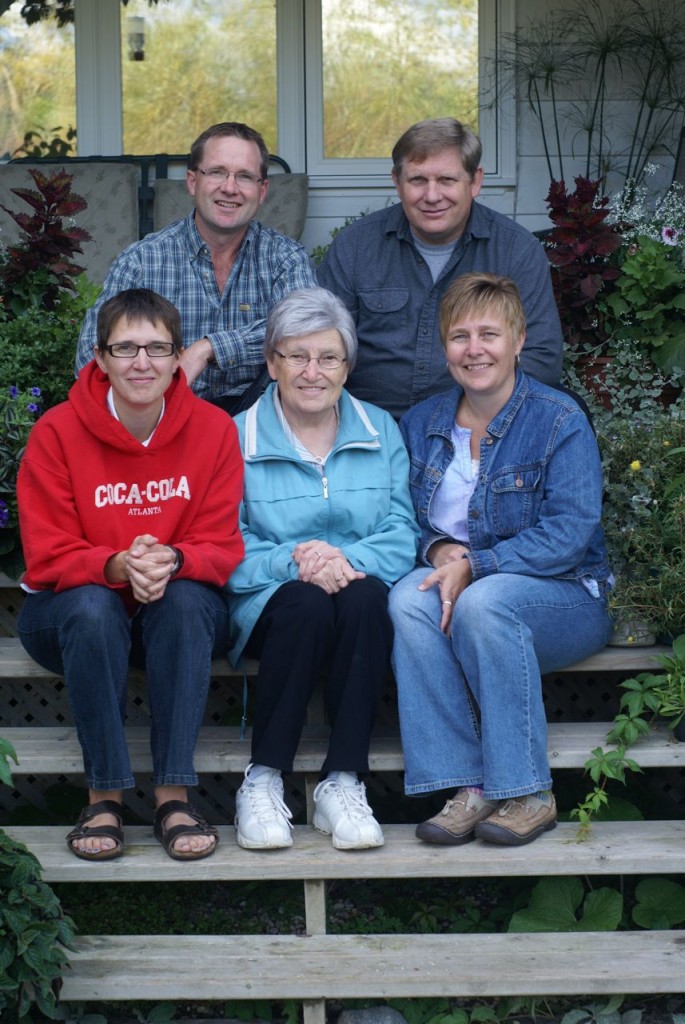
Mom with her four children, taken last summer
One of Mom’s last wishes was that we, her children, wouldn’t start fighting over anything after she was gone. She’s seen too many families fall apart after the parents are gone and she didn’t want that to happen to us. Fortunately, we like each other too much to stop talking to each other.
Another of Mom’s last wishes was that we wash all her clothes and give them away. True to character, she wanted to make sure someone would benefit from her departure. In her honour, and to help Mom’s husband prepare to move to a new apartment, two of my siblings and I spent much of yesterday packing up her clothes and other belongings, finding homes for whatever we could.
This afternoon, I took Mom’s two pairs of glasses to an optometrist shop in the mall. “Do you accept old glasses for charity?” I asked. “Yes,” said the young woman, and I handed them to her.
As the glasses changed hands, I thought to myself “this young woman has no idea what the meaning of this moment is. To her, they’re just a couple of old pairs of glasses. She has no idea that they were once worn by the woman I loved most in this world. She has no idea that I’m handing them over to her because I’m living out the legacy of generosity that this woman taught me. She has no comprehension of the thousands of times I looked through those glasses to the eyes that smiled behind them. She doesn’t know that these glasses are connected to the face that was love and warmth and home for me.”
The woman thanked me and I turned away, tears in my eyes. Even though to her it was an ordinary moment in an ordinary day, it was a sacred moment to me.
As I walked away, I wondered “how many moments have I missed that were sacred for other people? How many times have people done or said something significant in my presence and I have (unintentionally, of course) simply brushed the moment off as mundane, ordinary, or even boring? How many stories have I heard from people that took all their courage to share and I have simply assumed they were ordinary stories that had no meaning?”
I took the thought a little further and wondered what would happen if I began to live with the intention of treating every moment as sacred.
What if I treat every encounter I have – with strangers, friends, or family – as if it might be the moment that the Sacred speaks to them? What if I assume that the people I meet could be facing monumental change or be floundering in oceans of grief and the simple encounter with me might feel like a life-line or a place of safety for them? What if I begin to look for the Sacred in each person I meet, expecting to witness something in them that is meant to speak to me? What if I assume a life could be altered by any ordinary smile, kind word, or gracious apology? What if I listen to every story that is shared, believing that it takes courage to share it and that my listening elevates the sacred in the moment for the person who is sharing it?
I can only imagine that, if this becomes my intention, I will live out the legacy of love and generosity my Mom left behind in her last wishes. There won’t be much fighting among my siblings with her life as our model.
by Heather Plett | Nov 30, 2012 | Uncategorized
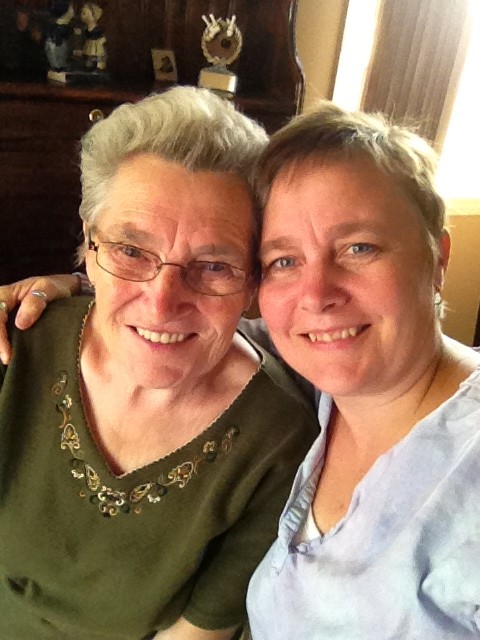
Mom & I, in the summer when she thought she'd beaten cancer
I sit down to write a blog post, and all that comes out is… I don’t have a mother anymore.
I try to write in my journal, and the only words that show up on the page are… I’m an orphan now. I don’t know how to be an orphan.
I turn to my work, and all I can do is stare at the blank page and think… Who am I now that both of my parents are dead?
I wander around the house aimlessly. I can barely focus enough to wash the dishes. I watch mindless TV. I putter. I sit long minutes lost in thought.
I phone my mom’s husband, my mom’s cheery voice comes on the answering machine, and I fall to pieces. It’s hard to leave a message when the one I really want to talk to won’t return my call.
Last week, when Mom was slipping away, and her mind was no longer always clear, she looked at me with sadness in her eyes. “I don’t know how to do this,” she said, in her nearly invisible voice. “I know Mom,” I said. “I don’t know how to do this either.”
And that’s how I still feel. “I don’t know how to do this.”
I don’t know how to get used to the fact that I can’t pick up the phone and call Mom. I don’t know how to write this grief in any way that makes sense. I don’t know how to tell you the story of what it meant to watch her die. I don’t know how to make meaning of the days of vigil, watching her slip away, carrying her emaciated body from bed to chair when she became restless, waking in the night to care for her, listening to her gurgling hanging-on-to-life breath.
I don’t know how to speak with this lump in my throat.
I don’t know how to be at the top of the family tree, the oldest woman in my line of descendants. I’m much too young to be the matriarch. I don’t want to take on that responsibility.
Last Saturday, when I was supposed to be hosting a day retreat for women of courage, I spent the day planning my Mom’s funeral. Instead of being the teacher, I was the student again, forced to learn new lessons in courage.
Grief is a cruel teacher. I want to skip this class. I want to rebel, climb out the window, and run away to a place where my Mom and Dad and son are still alive. I don’t want to stay here and write the test. Not again, please. I’ve been through this class a few times already – can’t I get an exemption this time? Can’t I just be the teacher now without having to learn any more of these difficult lessons?
I haven’t been given a choice though. I have to stay here and learn the lessons I have yet to learn. I have to pay attention – to be present in the pain, to let the tears come, to let the panic wake me in the night, to remember again and again what her empty eyes looked like when the breath left her body. I have to let another death change my life.
I have to bear the burden of this fresh crack in my heart, remembering that the pain is telling the story of the privilege of being loved. I have to remind myself that my heart can break without falling apart because it has been made resilient by love. My life can feel this emptiness because I’ve known fullness.
I will get angry at the teacher now and then, and I will lay my head down on my desk when the learning feels too heavy, but I will stay here in this class. There’s nothing “fair” about it, and right now the pain is blinding me from seeing the blessings, but, in the end, I know I will be richer and wiser for having had the courage to love and the courage to grieve.
My heart is broken, but I will learn to dance with a limp.
“You will lose someone you can’t live without,and your heart will be badly broken, and the bad news is that you never completely get over the loss of your beloved. But this is also the good news. They live forever in your broken heart that doesn’t seal back up. And you come through. It’s like having a broken leg that never heals perfectly—that still hurts when the weather gets cold, but you learn to dance with the limp.” ― Anne Lamott
by Heather Plett | Nov 26, 2012 | Uncategorized
Just like we did at Dad’s funeral nine years ago, each of the four siblings shared a tribute to our beautiful mom. This is what I shared…
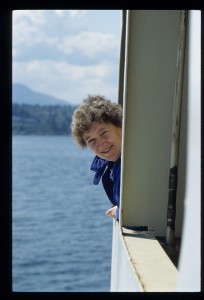 I’m curious about something… How many people in this room have had a chance to taste some of my mom’s baking? Some of you may not even know you’ve had it… If you attended a potluck either in Landmark or in Arden, you probably had some. If you attended Cynthia’s wedding, you probably had one of her buns. If you worked with me or my siblings, or visited our homes, you may have had something she’d sent us home with. There was always lots to go around.
I’m curious about something… How many people in this room have had a chance to taste some of my mom’s baking? Some of you may not even know you’ve had it… If you attended a potluck either in Landmark or in Arden, you probably had some. If you attended Cynthia’s wedding, you probably had one of her buns. If you worked with me or my siblings, or visited our homes, you may have had something she’d sent us home with. There was always lots to go around.
There’s a story in the Bible about Jesus looking around and seeing a lot of hungry people and realizing they needed to be fed. With only a few loaves and fishes, he managed to feed 5000 people. In the process, he gave them not only food, but love. Well, I think my Mom took that story to heart and made it her personal mission to feed all the hungry people she could find. With a few of Dad’s farm eggs, some Prairie Dawn flour, and her magical hands, she too fed 5000 people. Even in her final days, when she could no longer stand and could barely speak, she still tried to get out of bed a few times, insisting that it was time for us all to sit down at the table and have something to eat.
That’s how our Mom lived her life – always giving, always loving, always making food for people. She never had much money, and yet she found ways to give that went far beyond what monetary riches could have done. Just like the story of the feeding of the 5000, I believe God worked a miracle through her hands.
Paul said yesterday that one of the reasons he married Mom was because he could see she had servant hands. He couldn’t have been more right about that assessment. St. Francis of Assissi is quoted as saying “Spread the good news, if all else fails, use words.” Mom didn’t need a lot of words to spread God’s love – she didn’t need to preach a sermon or write a book – she just needed her beautiful, loving hands.
In the last week of her life, when my siblings and Paul and I cared for her, several visitors stopped by or phoned to show their love for Mom. In the stories that were shared, we heard these four common themes that mirrored what we already knew about Mom:
- Mom was one of the most loving and generous people they’d ever known.
- Mom liked to feed people.
- Mom loved adventure.
- Mom loved to play games.
Growing up, most kids go through a phase in their lives when they feel embarrassed about their Moms, for one reason or another. I don’t ever remember feeling that way, partly because my friends all thought I had one of the coolest and kindest Moms around. Some of my friends still talk about how good she was at telling stories in church, bringing fun and life into everything. She was also the most fun to have at the Sunday School or community picnics, because she’d rather have a water fight with the kids than sit in boring conversation with the grown-ups. I think sometimes my friends came over as much to hang out with Mom as to visit me.
She would never have said this about herself, but my mom was a healer – she helped God heal wounded souls. Henri Nouwen talks about the wounded healer, who is able to reach out to people from the place of their own woundedness. Mom was one of those wounded healers. She suffered some pretty deep wounds in her early life, losing two brothers and her mom, and that allowed her to be deeply compassionate to the wounded people she encountered in the world.
Growing up, we had to get used to a lot of wounded people spending time in our home. Whether it was the young children whose Mom was unable to care for them, or a young mom who was going through trouble in her marriage, Mom felt compelled to bring them home and wrap them in her love. Some people bring wounded animals home, Mom brought wounded people – and she didn’t let them go until they’d been well fed and well loved. Just recently she told me about some lonely teenage girls who started to drop by and play games with her and Paul. I had to chuckle, because I knew Mom couldn’t resist opening the door to them, even when her own health was failing.
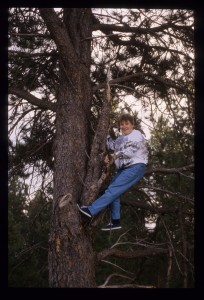 At the back of the program, you’ll find a photo of Mom climbing a tree. A tribute to our Mom wouldn’t be complete without talking about how she loved to climb almost anything she could find to climb, especially trees. My kids were always proud of the fact that they had one of the only Grandmas who would climb trees with her grandchildren. She’d also climb big rocks or mountains or climbing walls. When she went to seniors camp a couple of times with Paul, she came home quite proud of the fact that she’d been the fastest one (or sometimes the only one) up the climbing wall. One of her friends told me that just this past summer on a trip they’d taken together, when Mom thought she’d beaten cancer, she’d found every opportunity she could to climb things. Right until the end, she lived life to the fullest.
At the back of the program, you’ll find a photo of Mom climbing a tree. A tribute to our Mom wouldn’t be complete without talking about how she loved to climb almost anything she could find to climb, especially trees. My kids were always proud of the fact that they had one of the only Grandmas who would climb trees with her grandchildren. She’d also climb big rocks or mountains or climbing walls. When she went to seniors camp a couple of times with Paul, she came home quite proud of the fact that she’d been the fastest one (or sometimes the only one) up the climbing wall. One of her friends told me that just this past summer on a trip they’d taken together, when Mom thought she’d beaten cancer, she’d found every opportunity she could to climb things. Right until the end, she lived life to the fullest.
When I turned 40, I decided to mark it by skydiving. Most Moms would try to dissuade their daughters from taking a foolish risk like that, but not my Mom. She came to watch and was jealous that she wasn’t the one jumping out of the plane.
It’s been really hard to write this tribute, and even now it feels so incomplete, because I just don’t know how to wrap words around a love and a passion for life like Mom had. Words seem trivial and almost trite. I know that the best way to write this tribute is to write it on my heart and to spread the love Mom gave to me to everyone I meet. I won’t be feeding the 5000 (that’s not my particular gift), but I will promise to live in the way that my Mom taught me – serving as a wounded healer, loving the lonely, using my gifts to make the world a little better, and relishing every adventure and tree-climbing opportunity I can find.
If you want to honour my Mom, I invite you to do the same. Spread the love of God in everything you do. Enjoy life to the fullest. Climb trees when you need a little excitement. And eat good food – especially buns and butter tarts.
Mom used to say that she didn’t expect many people to show up at her funeral. We’d always laugh at her when she said that, because we had a much greater sense than she did just how many people she’d touched in her life. Along with her great love, she had great humility. But a love like that spreads (especially when it’s clothed in humility), and now I stand in front of a church full of people who’ve been touched by her in one way or another. All week, I’ve been getting emails and phone calls from other people she’s touched who couldn’t be here today, including one from a man she befriended in a hotel in Colorado this past May.
What a legacy she has left! The love she shared isn’t easily forgotten. Thank you for proving her wrong and filling this room. If Mom were here, she would have found the most wounded people in the room by now and given them each a hug. I could really use one of those hugs right now.
by Heather Plett | Nov 25, 2012 | Uncategorized
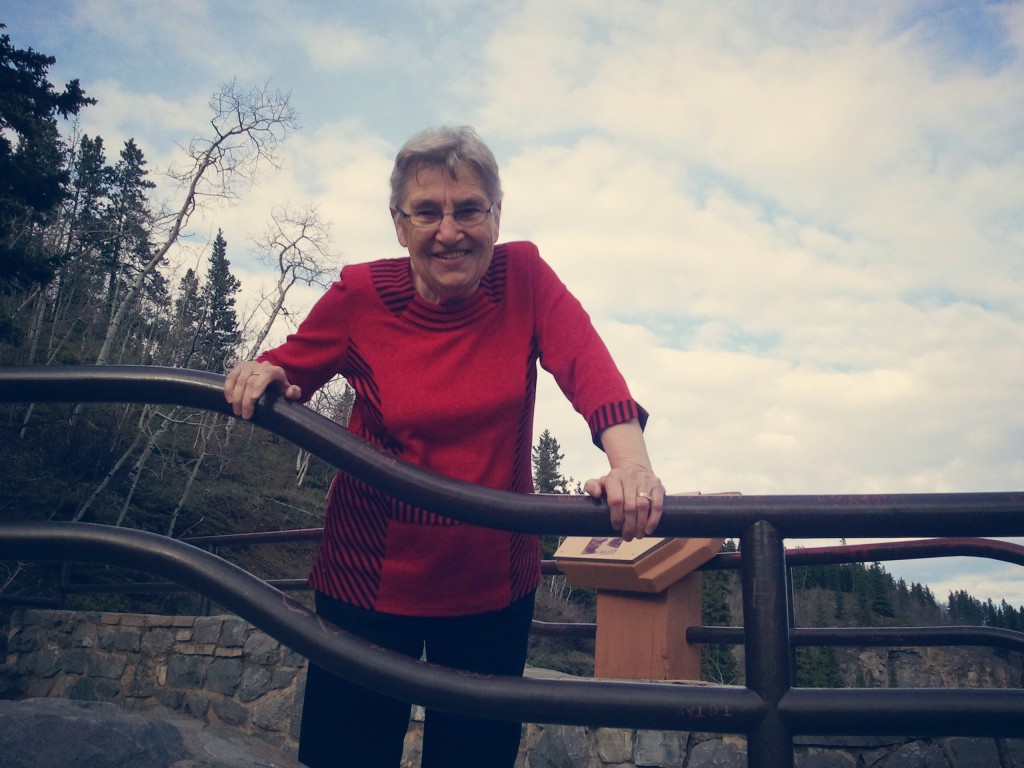
A week ago, we knew she was slipping away. My siblings and I dropped everything and went to her side. We were with her almost all week, caring for her in her home so she didn’t have to go to the hospital. In the early hours of Friday morning, November 23rd, all four of us gathered, together with her husband, to watch her make the final transition from this life to the next.
My life is forever changed. There is no way to put this into words yet, but I will, some day. For now, I will simply sit with the grief of being a motherless, fatherless daughter.
Her funeral is on November 26th, at 2:00 at Prairie Rose EMC Church in Landmark, Manitoba. More details here (scroll down to Margaret Plett Vanderwoude).
Her obituary can be found here.







